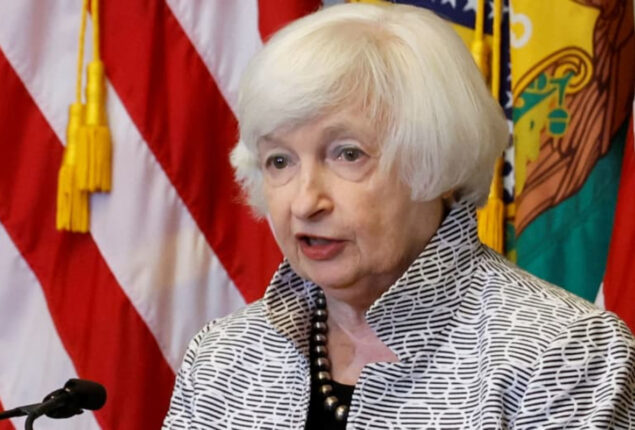Treasury Secretary Janet Yellen believes that inflation will “remain high”
"Treasury Secretary Janet Yellen admitted on Tuesday that she and Federal Reserve...

US hits debt limit, aid extraordinary measures to avoid default
Treasury Secretary Janet Yellen informed congressional leaders that the United States has reached its debt ceiling and has begun taking “exceptional measures” to prevent a catastrophic default for at least the foreseeable future.
“[T]he period of time that extraordinary measures may last is subject to considerable uncertainty, including the challenges of forecasting the payments and receipts of the U.S. Government months into the future,” Yellen wrote in a letter to House Speaker Kevin McCarthy. “I respectfully urge Congress to act promptly to protect the full faith and credit of the United States.”
The “extraordinary measures” put a hold on contributions and investment redemptions for government workers’ retirement and health care funds, giving the government enough financial space to handle its day-to-day expenses until roughly June.
Concerns have been expressed about whether the United States can avoid a major economic disaster in the wake of President Biden’s disagreement with House Republicans, which has prompted the expected move.
According to Yellen, the federal government has hit its artificially imposed borrowing limit of $31.381 trillion, which lawmakers have increased almost 80 times since the 1960s.
Even many anxious analysts believe a deal will be reached.
But given the stark contrasts between Mr. Biden and McCarthy, who is in charge of a disgruntled Republican caucus, this particular moment appears more tense than previous encounters with the debt ceiling.
These discrepancies raise the possibility that the government will forego paying its debts due to political considerations, which might spook financial markets and, if left unattended, send the world’s largest economy into an entirely avoidable recession.
The two have a few months to come to an agreement, but due to years of growing partisan enmity, there are now competing demands that make it difficult for American lawmakers to collaborate on a fundamental job.
Mr. Biden refuses to even begin discussions with Republicans and insists on a clean raise to the debt ceiling so that current financial obligations may be met.
McCarthy is advocating for talks that, in his opinion, will result in budget reductions. After a contentious start to the new Congress that required 15 votes to install McCarthy speaker, it is unclear how much he intends to cut and whether his fellow Republicans would support any arrangement.
Asked twice Wednesday if there was evidence that House Republicans can ensure that the government will avert a default, White House press secretary Karine Jean-Pierre said it’s their “constitutional responsibility” to protect the full faith and credit of the United States.
She did not say whether the White House saw signs at this stage that a default was off the table.
“We’re just not going to negotiate that,” Jean-Pierre said. “They should feel the responsibility.”
McCarthy, for his part, stated that Mr. Biden must understand the political realities associated with a split government.
He compares the debt ceiling to a credit card limit and urges budgetary restraint that was absent under Republican President Donald Trump, who in 2019 authorized a bipartisan suspension of the debt ceiling.
“Why create a crisis over this?” McCarthy said this week. “I mean, we’ve got a Republican House, a Democratic Senate. We’ve got the president there. I think it’s arrogance to say, ‘Oh, we’re not going to negotiate about pretty much anything’ and especially when it comes to funding.”
McCarthy, for his part, stated that Mr. Biden must understand the political realities associated with a split government.
He compares the debt ceiling to a credit card limit and urges budgetary restraint that was absent under Republican President Donald Trump, who in 2019 authorized a bipartisan suspension of the debt ceiling.
“A deal probably won’t be reached until the last minute, raising the risk that the deadline to lift the ceiling is inadvertently missed,” said Andrew Hunter, senior U.S. economist at Capital Economics.
Catch all the US News, World News, Breaking News Event and Latest News Updates on The BOL News
Download The BOL News App to get the Daily News Update & Follow us on Google News.